Name: Jenn VanGemert.
Occupation: Scientist Extraordinaire: Neutrino Physicist, Pharmaceutical Chemist, Medical Device Regulatory Affairs Specialist.
Hobbies: Baking, cosplay, painting, making videos, world domination.
==========

Joseph: Welcome to Five Question Interviews! I hope you enjoy your time here, as we delve deep into the burning questions on everyone’s minds.
Jenn: Bring it on!
JD: As you know, Five Question Interviews is a unique interview format in which you will only be asked five questions (excluding follow-up questions), derived from your own interests and fan suggestions. I have compiled some good questions, so prepare yourself!
JV: Let’s get this party started!
JD: I think Pink would agree!
Question #1: What is your current occupation?
JV: At this moment I am a Regulatory Affairs Specialist for a medical device company. I have a couple product lines assigned to me for tools and devices used in operating rooms, and any time a medical professional or patient has a complaint regarding a malfunction of one of those devices I have to evaluate it against the regulations put in place by the FDA (as well as the local competent authority in the case of international events). I’m looking for whether or not it’s something that did or could cause an injury or worse to someone, and then report it to all of the appropriate authoritative bodies accordingly.
JD: Sounds like pretty in-depth work, every time something goes wrong. When you compare to the FDA’s regulations, are you looking to see if somehow the creators of the device missed something important?
JV: Fortunately, there are enough systems and checks in place that it would be nearly impossible for something to get missed in the creation and approval of a device. Most things that “go wrong’ are a result of wear and tear or misuse, or sometimes a one-off manufacturing mistake. We keep track of every malfunction that comes in (I see about 30 new ones a day across all my products) to look for trends in particular failure types to monitor for any widespread issues, but even medical devices are not infallible. Sometimes things just break.
JD: So you’re more likely to see a problem in the manufacturing of a device than in its actual design.
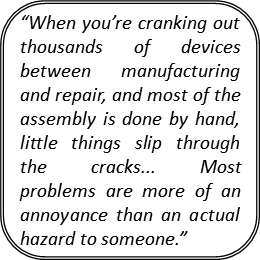 JV: Correct. When you’re cranking out thousands of devices between manufacturing and repair, and most of the assembly is done by hand, little things slip through the cracks. The bright side is that most problems are more of an annoyance than an actual hazard to someone. One device has a screw in it that has to be torqued into place, and there’s a spec for how tight it should be. Sometimes it doesn’t actually get set that tight, so eventually the screw comes loose inside the handle and the device just makes a really awful, loud sound when you turn it on. No one wants to use something that makes a terrible sound, so they’ll call it in, but it was never a danger to anyone.
JV: Correct. When you’re cranking out thousands of devices between manufacturing and repair, and most of the assembly is done by hand, little things slip through the cracks. The bright side is that most problems are more of an annoyance than an actual hazard to someone. One device has a screw in it that has to be torqued into place, and there’s a spec for how tight it should be. Sometimes it doesn’t actually get set that tight, so eventually the screw comes loose inside the handle and the device just makes a really awful, loud sound when you turn it on. No one wants to use something that makes a terrible sound, so they’ll call it in, but it was never a danger to anyone.
JD: You have also described yourself as a physicist, pharmacist, and chemist. How often do you utilize your expertise in these fields?
JV: Not as much as I would like to anymore. I have degrees in chemistry and physics, and my first job out of college was at a high energy physics lab working on a neutrino experiment. When I had to move from that area to actually live in the same place as my now-husband, I got a job in pharmaceutical chemistry and worked that for 2 years before going where I am now. I would love to eventually get back into a lab, but my skills aren’t going totally to waste in the regulatory space. There’s a lot of technical work involved between coordinating with the engineers and repair techs on complaints and working with the FDA, so while I’m not directly mixing chemicals or tracking down neutrinos anymore, I’m able to use those backgrounds to better understand the device failures and navigate the regulations.
JD: That actually brings me to my next question, what degrees do you hold? What education did you undergo to get into the fields you’ve worked in?
JV: Look at me being all psychic and stuff! I have bachelor’s degrees in both chemistry and physics, with a minor in math to round it out. The running joke is that I thought I was getting too much sleep having just one major. It’s certainly easier to get the kinds of jobs I’ve had with a masters or PhD under your belt, but there’s a lot to be said for being able to prove how hard you’re willing to work. Having both degrees made it easy to showcase that, and gave me a diverse enough background that I can bend and fit into a wide variety of fields and jobs if I want to.
JD: Would there ever be a reason to get any higher education?
JV: There is certainly reason to, but none of those reasons interest me. I actually applied for graduate school two years ago, and got accepted into a pretty competitive PhD program for chemical engineering, fully funded by the school. I wouldn’t have had to pay for anything, and they were actually going to pay me a little on top of that. It was a really great offer, but after sitting on it for a while I realized I didn’t actually want to do it. I was going to go because that’s what I thought I should do. You go to high school, you go to college, you go to graduate school. That’s the logical order of things. When I really sat back and thought about it though, I had zero interest in taking my education any further. I could do the kinds of things I wanted to do with the degrees I had, and the doors that would open with the higher degrees didn’t appeal to me enough to justify 7 to 8 more years of sleep deprivation and grilled cheese sandwiches.
JD: To be fair, grilled cheese sandwiches are kind of amazing.
JV: Especially mine. I’m a terrible cook, but I can make an epic grilled cheese sandwich.
JD: But in response to the rest of your answer, I would say fair enough. That’s actually why I worded my question the way I did. Sometimes you get a master’s degree because you feel like that’s the next logical step, but you really need a reason to wait that much longer to start your career, or for most of us, rack up more student debt.
JV: Exactly. I was ready to just get started and feel like a productive member of society. I haven’t ruled out ever going back and doing an advanced degree, but it’s not something I feel I need to do right now and I’m happy with my current track and options.
JD: Seems like a legit segue into…
Question #2: In the area of science, physics, and chemistry, where do you see yourself in, say, 10 years from now? What is the ideal in your field? A research position? A teaching position at a university? A cushy job at a large company?
 JV: The cool thing about these fields is there isn’t really an ideal. There are certainly non-ideal places to be (sewage testing anyone?), but the top of the food chain is less of a step on a ladder and more of a wide platform. Personally, I’d love to be in an R&D type position back in a lab. I’m a troubleshooter at heart, and the most fun I’ve ever had was actually a project I published a paper on. Someone showed up at my lab and said “this stuff keeps turning yellow and I have no idea why, help me!” I got to dig into what was causing the change, what exactly was changing, quantify what effect it was going to have on their project, and come up with ways to combat and prevent it. Being able to go back to that sort of role, but get the support and funding that comes with being in the field 10 years over 1 or 2, would be amazing. The company I’m at now encourages finding your niche, and they’re currently in the process of building a lab to bring some of the testing we do externally back in-house. To say I am keeping a close eye on its progress is an understatement!
JV: The cool thing about these fields is there isn’t really an ideal. There are certainly non-ideal places to be (sewage testing anyone?), but the top of the food chain is less of a step on a ladder and more of a wide platform. Personally, I’d love to be in an R&D type position back in a lab. I’m a troubleshooter at heart, and the most fun I’ve ever had was actually a project I published a paper on. Someone showed up at my lab and said “this stuff keeps turning yellow and I have no idea why, help me!” I got to dig into what was causing the change, what exactly was changing, quantify what effect it was going to have on their project, and come up with ways to combat and prevent it. Being able to go back to that sort of role, but get the support and funding that comes with being in the field 10 years over 1 or 2, would be amazing. The company I’m at now encourages finding your niche, and they’re currently in the process of building a lab to bring some of the testing we do externally back in-house. To say I am keeping a close eye on its progress is an understatement!
JD: Sounds like an exciting prospect!
Can you tell us more about your first big research project?
JV: Of course! My first big research project was at the physics lab (Fermi National Accelerator Laboratory), when I was actually doing some more chemistry focused work. When you hear about particle detectors, they’re sort of a black box of mystery to the average person. They’re made up of several layers, each layer serving a particular purpose and being better suited to detecting certain types of particles. Some of these layers work via scintillation, which means that every time a particle passes through them and interacts with the material they emit light. Electronics are set up to detect that light, and based on its brightness and location, and the location of all the other light emissions, you can figure out what kind of particle you had and map its exact path. Those scintillation materials have to be man-made by mixing special chemical compounds into various mediums (some are solid, some are liquid; which you use depends on exactly what you’re trying to accomplish and how much funding you have on hand), which is where I came in.
The compound that has the “best” scintillation properties for dark matter and neutrino experiments is tetraphenyl-butadiene, or TPB for short. It’s super effective (insert Pokémon joke here) but super expensive, so finding the most efficient way to use it, and not letting any of it going to waste, is crucial. A new dark matter detector was being built at the lab, and it was utilizing TPB as a thin layer of material on some quartz plates for their scintillation. The plates all have to be handmade due to their fragile nature, and that’s a long process when you’re making thousands of these things. They started to notice that the plates they had made first were starting to turn yellow, which when you’re talking about detecting light emissions can be a really bad thing. So they brought it to my lab and asked us if we could figure out what was going on. I got to learn all kinds of new equipment, and spent weeks taking these bad plates apart and testing them optically and chemically to see what changed from when they were made to when they “went bad”. I was actually able to identify the actual chemical mechanism that was happening, give them a timescale of how long it takes for it to make an impact on their data collection, and help start them on finding different ways to mix up their solutions to stabilize the TPB to fight the degradation.
Man I tried really hard to not make that a book… My bad!
JD: While all of this really sounds fascinating, I’m mostly just nodding and smiling.
JV: Here’s a secret: I do that a lot too still.
JD: In fact, I feel like I’m in an episode of Breaking Bad! Cool!
When did you first become interested in science? Similarly, what was the moment when you knew that you wanted to pursue a career in science?
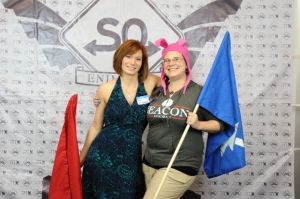
JV: I’ve always sort of been interested in science. I was really good at it in school in my early years, and it was the only class I actually consistently paid attention in. In the 6th grade we had to do a science fair project, and I ended up doing something that was ultimately a chemistry experiment, though I didn’t know it at the time. I aced chemistry in high school and took the AP course for it, but oddly enough did not intend to go into science when I entered college. I actually went to college to get a degree in music education. Music was a big part of my life, and a lot of who I am now stems from that. Even though I wanted to teach, it was still a requirement to audition for the music school as a performer, and I didn’t make the cut. I had the option to re-audition the next year, so I decided to start my education courses and my general education classes in the meantime. Of course, one of those was chemistry, and I quickly remembered how much I enjoyed it and, frankly, how good I was at it. I decided it was sort of stupid to ignore the fact that I was actually really good at something, and dropped the idea of getting into the music school in favor of pursuing science.
JD: I didn’t even know you were a musician! Why am I always the last to know things!
JV: It’s all a big conspiracy. You weren’t supposed to find out this way!
JD: When you say it like that, I have this image of a musical instrument sneaking out an apartment window…
JV: Complete with bed sheet rope of course, yes?
JD: Nailed it.
Question #3: Recently, there was a rather important event called the LoZeldaThon, named after your Rooster Teeth Community name, LoZelda. How would you describe this event to readers who may never have heard of it?
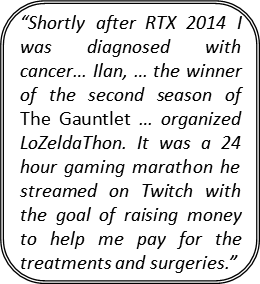 JV: Magic. I would describe it as magic.
JV: Magic. I would describe it as magic.
To make the story as short as possible, shortly after RTX 2014 I was diagnosed with cancer. Fun fact: even in the best of circumstances, cancer is kind of really crappy, and also kind of expensive to deal with. Ilan, one of my good friends, a fellow RTX Guardian, and probably better known as the winner of the second season of The Gauntlet, thought it was ridiculous that anyone should have to worry about things like survival rates on top of essentially paying for better odds, so he organized LoZeldaThon. It was a 24 hour gaming marathon he streamed on Twitch with the goal of raising money to help me pay for the treatments and surgeries. It ended up being 26 hours of hilarious, emotional, ridiculous moments with guests, giveaways, and constant support both for him and myself.
JD: I hear there is actually a second LoZeldaThon scheduled for the near future, this time to help another RT Community member. In fact, the “LoZeldaThon” may become a semi-common event to help fellow community members in situations such as yours. How has the LoZeldaThon changed the way you view, or interact with, the Rooster Teeth Community? How would this be any different if you were on the outside looking in?
JV: There is a second one! I am far from the first member of the community to have something so major affect their life, and I won’t be the last. LoZeldaThon was not just a success for support my problem, but for showing how powerful a community can be. If you totaled up the donations from every person who actually said the phrase “I’m sorry I can’t donate more” during that stream, it made up almost $1000. Small gestures are still powerful ones, and they all add up.
I’ve always known the Rooster Teeth Community was special. I’ve seen it in how they’ve pulled together for the company and for other community members. Seeing the way the stream happened solidified that, and really proved that every time someone says, “This is the best community ever,” it’s not just a convenient phrase or pandering. It’s 100% truth.
On the outside looking in, I’d like to think it would make someone go “wow, why aren’t I an active part of this?” The internet is a weird and scary place. To find a group of people who act like a family despite their relationships existing mostly in a digital format is uncommon at best, and we get to experience it daily.
Question #4: You’ve already described your experience as an RTX Guardian in a journal on your community profile, and you’ve given advice to people wanting to be a Guardian. So what I want to know is what insight have you gained on the convention as a whole through your experiences as a Guardian?
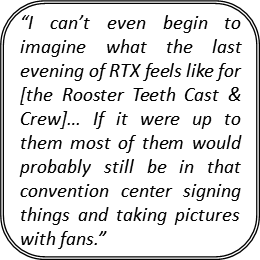 JV: Keeping a convention running smoothly is a beast, different than any other organizational nightmare you could ever imagine. You are relying on people you just met, and even some people you will never meet who exist solely as a name on a piece of paper, to do their jobs and do them well so that the gears keep turning. There’s a level of trust you have to have in people who haven’t done little to earn it, and the success of the event hinges on that trust. There’s only so much anyone can do; even the almighty organizers are not immune to it.
JV: Keeping a convention running smoothly is a beast, different than any other organizational nightmare you could ever imagine. You are relying on people you just met, and even some people you will never meet who exist solely as a name on a piece of paper, to do their jobs and do them well so that the gears keep turning. There’s a level of trust you have to have in people who haven’t done little to earn it, and the success of the event hinges on that trust. There’s only so much anyone can do; even the almighty organizers are not immune to it.
Any Guardian you talk to will tell you the event is exhausting on a level few other people will ever experience. After spending so much time behind the scenes with the cast as a PA [Michael Jones’s Personal Assistant] and seeing what they do, I can’t even begin to imagine what the last evening of RTX feels like for them. They genuinely want every attendee to have a good time and would love to meet every one of them, and if it were up to them most of them would probably still be in that convention center signing things and taking pictures with fans. Their dedication to their fanbase is incredible and awe inspiring.
JD: As evidenced by the fact that many were out on the streets giving autographs for hours after the fire alarm incident.
JV: Oh man, the fire alarm incident… that was a doozy! There were several of us “working” to whatever degree we could well after it got dark out. I’m not convinced the lead Guardians or any of the event organizers from Rooster Teeth itself actually went to bed that night.
JD: You may be right.
What advice would you give normal RTX attendees, based on what you’ve learned as a Guardian?
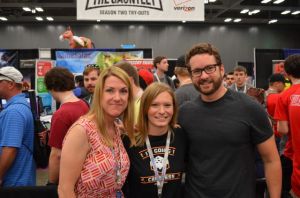
JV: Be aware that there are literally tens of thousands of other people in the building who want to do the same things you do. Thanks to the limitations of space and time, it just isn’t possible to do all of it. In that spirit, the Guardians are there to try to keep things to a reasonable level of organized chaos. We are well aware of the limitations of the timing of panels or size of rooms, and all we can do is try to keep things safe and as fair as possible. It goes back to that trust thing: you have to trust we’re not making up rules for the sake of making them up, and we have to trust that you’ll follow the instructions you’re given. As soon as that breaks down, everyone ends up unhappy.
The Guardians don’t get to really “do” RTX. We work the whole weekend, and in exchange we get a t-shirt and a sincere thank you. We’re not doing the job to hang out with staff (because even as a PA, that doesn’t happen), we’re not doing it because we get paid (because we don’t, unless you count a t-shirt as currency), we do it because we want to be a part of the experience. We give up our RTX so you can have yours, and I just ask that you keep that in the back of your head.
Question #5: If you could change one thing about RTX, what would it be and why? If you feel strongly enough about the subject, you may give more than one answer if you feel so inclined.
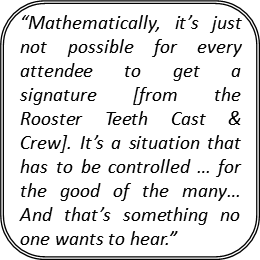 JV: Wow, that’s a weighted question. I’m heavily biased from my experiences this year, but I would change up the way autographs are done. I think they should still be a part of the convention, because it is really cool to have that one-on-one interaction, no matter how brief it is, but they are constantly a logistical nightmare. This year they moved them off the main convention floor, but they were still highly visible and led to a lot of “but they’re right there!” type of comments from attendees who wanted in to the line. I’d love to see them moved to one of the rooms upstairs. It’s an enclosed space, so not only do you remove the crew from view, you can more easily control the line and keep it to a reasonable length.
JV: Wow, that’s a weighted question. I’m heavily biased from my experiences this year, but I would change up the way autographs are done. I think they should still be a part of the convention, because it is really cool to have that one-on-one interaction, no matter how brief it is, but they are constantly a logistical nightmare. This year they moved them off the main convention floor, but they were still highly visible and led to a lot of “but they’re right there!” type of comments from attendees who wanted in to the line. I’d love to see them moved to one of the rooms upstairs. It’s an enclosed space, so not only do you remove the crew from view, you can more easily control the line and keep it to a reasonable length.
JD: That actually makes a lot of sense.
JV: I have my moments.
JD: Of course!
JV: Mathematically, it’s just not possible for every attendee to get a signature. It’s a situation that has to be controlled in a fashion that is very “for the good of the many over the one or the few”. And that’s something no one wants to hear.
JD: How very Star Trek of you. The best way to make that message clear to people is direct them to the way autographs happen at larger conventions, like Comic-Con. Nobody steps foot in the convention hall on a given day knowing beyond a shadow of a doubt that they will get an autograph from X, Y, and Z.
Thank you for taking the time to meet with me today! However, we’re not finished just yet.
One of the unique elements of Five Question Interviews is that now that the interview is complete, you have a chance to ask me one question. What have you prepared for me?
JV: I have a very, very important question for you. One that could possibly alter the course of humanity.
Mayonnaise or Miracle Whip?
JD: Actually…
For me, neither.
JV: *gasp* What do you put on your sandwiches?!
JD: Meat, cheese, pickles, bread (of course). Now I’m hungry thinking about it.
JV: No condiments at all? Wow.
JD: Well, if I’m having a burger I’ll definitely have some ketchup on there. But if it’s just a slider (which we have at my house every once in a while) it doesn’t even need ketchup.
JV: I… I don’t know what to say.
JD: I know, I know, I’m a Philistine.
But now you’ve had us talking about grilled cheese, sandwiches, burgers…
JV: A lot of my diet consists of foods I can hold.
JD: That’s not such a bad thing.
JV: Tell that to my waistline.
JD: Again, thanks for meeting with me today. I apologize for ruining the mood with my lack of condiments. Seems like we’re ending on such a sad note.
JV: Obviously that just means I have to come back sometime.
JD: I hope you do! Good luck in your future endeavors in the world of medical device troubleshooting and neutrino physics!
JV: Thank you! Good luck with your naked sandwiches!
JD: Omnomnom.
If you want to know more about Jenn VanGemert, you can find her at:
- Twitter: http://www.twitter.com/MIGamerGirl
- YouTube: http://www.youtube.com/MadQueenZelda
- Rooster Teeth: http://www.roosterteeth.com/LoZelda
Have a question for Jenn that has not yet been asked? Do you want to see Jenn return and answer more of your questions? Suggest more questions below! Did you enjoy the interview? Leave your feedback below, subscribe, and share with your friends!